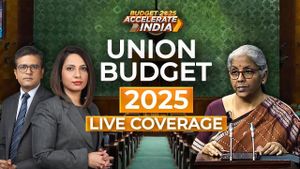On February 1, 2025, President Donald Trump declared Venezuela's agreement to accept illegal migrants deported from the United States, marking a significant development amid his administration's continued crackdown on illegal immigration.
Trump made the announcement via his platform Truth Social, stating, "Venezuela has agreed to receive, back to their Country, all Venezuela illegal aliens who were encamped in the US, including gang members of Tren de Aragua." This proclamation came shortly after the return of six American detainees who had been held captive by the Venezuelan government.
During his update, Trump emphasized the collaborative efforts underway, noting, "Venezuela has also agreed to supply the transportation back." This cooperation suggests the assertion of a newly prioritized relationship between the U.S. and Venezuela, particularly under the leadership of president Nicolás Maduro.
Richard Grenell, Trump's special envoy, played a pivotal role during this turn of events. He traveled to Caracas on January 31, 2025, to negotiate this agreement with Maduro. The meeting reportedly led to the unconditional release of the American hostages, showcasing diplomatic exchanges between the two nations even as tensions lingered.
Trump's announcement marks part of his administration's broader initiative to enforce what he calls "the largest deportation campaign in U.S. history." During his presidency, he has vowed to deport millions of undocumented immigrants. His aggressive stance has been solidified through various executive orders aimed at tightening immigration policies.
Following his meeting with Maduro, Grenell returned on the same flight as the six released Americans, who were later photographed smiling alongside him. This image has underscored the positive outcome of the discussions and the opening of channels between the two countries.
While Trump celebrated these developments, the U.S. actions toward immigrants have drawn both support and criticism. With significant numbers of illegal immigrants being apprehended, the U.S. has ramped up operations to deport large groups, previously challenging for countries like Colombia to receive returning migrants.
Importantly, Trump noted during his declaration, "We are in the process of removing record numbers of illegal aliens from all countries, and all countries have agreed to accept these illegal aliens back." This statement highlights the administration's ambitious plan to implement military-style deportation operations, which critics argue infringe on human rights.
U.S. Vice President JD Vance confirmed these operations, stating, "Military aircraft and other means have been used to deport large numbers of people from Latin American countries like Venezuela and Colombia." His comments reflect the administration’s approach as they attempt to remove backlogs of undocumented individuals.
With Mexico and various Central American governments maintaining different levels of cooperation, the potential for increased deportation efforts lies heavily on diplomatic negotiations and international relations. Trump’s administration faced significant challenges, especially as they planned the deportation of those fugitives who had sought refuge and safety within U.S. borders over the past several years.
The issue remains polarizing. While proponents of stricter immigration policies argue for the necessity of reverting undocumented individuals to their home countries, critics argue such methods are extreme and fail to address the root reasons individuals flee their countries seeking safety and opportunities.
Trump's position is clear; he intends to strengthen existing laws and push for aggressive enforcement. His meeting with Maduro possibly signals not only strict immigration protocols but also mutual benefit between the two nations—a shift many would not have foreseen just years prior.
Citing past concerns, analysts point out the logistical challenges involved: how to efficiently manage deportations without infringing on civil rights and international obligations. The clarity around Venezuela's agreement to accept deportees will push other nations to follow suit or resist pressure from the U.S. administration.
The agreement also arrives just after Trump threatened sanctions against Colombia if the country did not comply with accepting deportees. This pressure tactic has brought results, resulting with Colombia reversing its earlier stance.
Deportation figures concerning Venezuelan nationals are expected to rise significantly. For many, the fear of returning to Venezuela resonates deeply, especially with political unrest and economic collapse impacting daily life.
Overall, Trump's immigration policies will continue to shape not only how nations interact with the U.S. but also the lived experiences of countless individuals caught within and between borders. The path forward for both Venezuelan nationals and U.S. policies remains uncertain, but the stakes are undeniably high.
Moving forward, the situation emphasizes the delicate balance of enforcing immigration laws and the human aspect of these complex narratives. The outcomes of newly established diplomatic ties may redefine both domestic policies and international relations for years to come.



